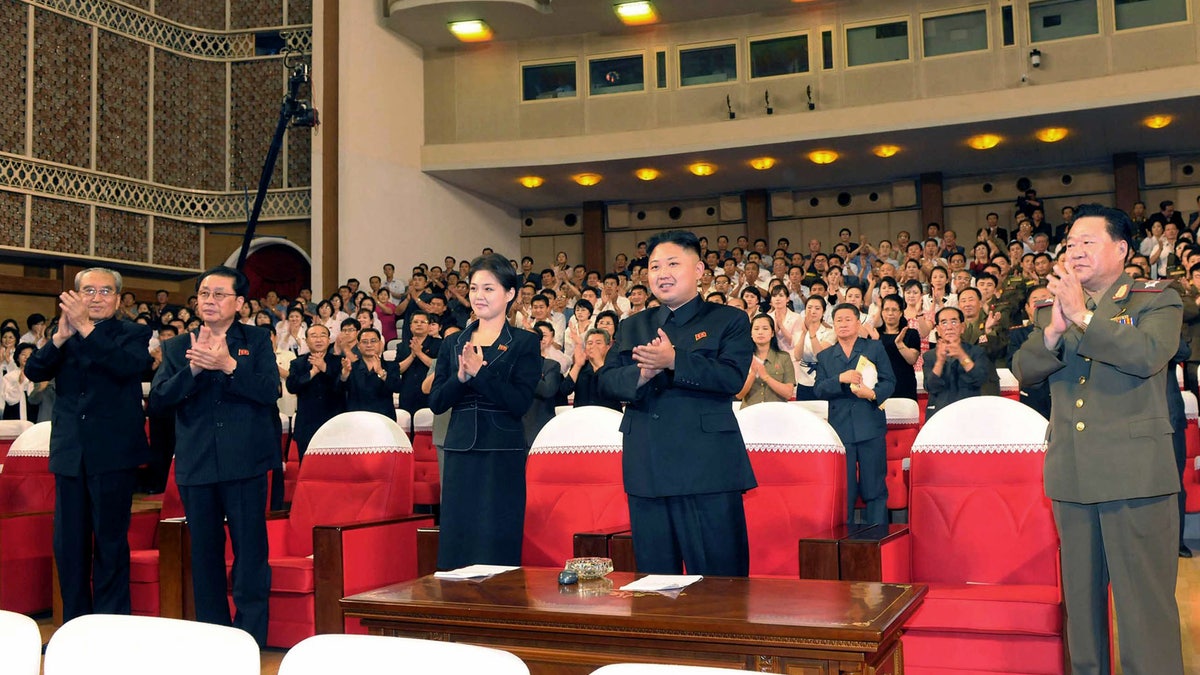
In this photo released by the Korean Central News Agency (KCNA) and distributed in Tokyo by the Korea News Service on Monday, July 9, 2012, North Korean leader Kim Jong Un, center right, and a woman clap with others as they watch performance by North Korea's new Moranbong band in Pyongyang, North Korea, Friday, July 6, 2012. The source did not identify the woman but South Korean media speculated that she could be Kims younger sister or wife. (AP Photo/Korean Central News Agency via Korea News Service) JAPAN OUT UNTIL 14 DAYS AFTER THE DAY OF TRANSMISSION
At the height of the Cold War, Kremlin watchers would assiduously monitor where the political and military leaders of the now-defunct USSR would be standing at the annual May Day parades in Moscow’s Red Square.
There’s been a similar game going on for decades in an attempt to understand what was going on in the political circles in the secretive PPRK, or North Korea.
It has been, though, a largely thankless task because there has been very little movement around the Kim family’s hereditary dictatorship that has ruled the country since its creation.
Most of the elderly generals that have stood next to them during parades through the years only disappear from the lineup when it seems they die in office. Few seem to retire.
That’s all changed now, though, with the retirement of Vice Marshal Ri Yong-ho, the chief of the North Korean military's general staff and one of the highest members of the ruling Workers' Party.
He was the most senior military figure in the Politburo. A vice marshal is a rank higher than a four-star general in North Korea.
The official line coming out of Pyongyang is that Vice Marshal Ri had to go because of “illness.”
But the 69-year-old vice marshal appeared to be in good health when he visited Laos on an official trip in May.
An official at South Korea’s Unification Ministry, which oversees Seoul’s relationship with North Korea, described his resignation because of ill health as “unusual.”
Sarah McDowell of IHS Jane’s told FoxNews.com:
“I would just say that the unusually hasty nature of the personnel decision bears the hallmarks of a purge, pointing to a power struggle in Pyongyang as Kim Jong-un attempts to build up his emerging power base.
“The young Kim may want to use Ri’s downfall to send a message to other potential challengers that he will not tolerate any rivals.”
It was certainly a strong message to any potential opponent, as usually purges are kept secret by Pyongyang.
It has been suggested, for instance, that back in 2010 the head of the party’s Planning and Finance Department was executed for an horrendously expensive attempt at currency reform.
Nobody knows for sure, but Pak Nam-gi hasn’t been seen again.
The replacement for Vice Marshal Ri is an obscure field commander called General Hyon Yong-choi.
According to the South Korean media, he has recently been in charge of the country’s northwestern region that borders China.
“The fact that he has never accompanied Kim Jong-un during his official activities, the promotion is a surprise and unusual,” said Cheong Seong-chang from Sejong Institute, The Korea Herald newspaper reported.
The reason seems to be that North Korea’s new leader is attempting to fill posts loyal to him and his family.
“The appointment of Hyon suggests that Kim is trying to re-assert control over the military by populating it with figures close to him,” McDowell said. “In general, the leadership transition appears to have been taking place relatively smoothly in recent months, but this latest incident indicates possible instability behind the scenes.”
The reason behind the political instability remains unclear, but it does seem to center on the relationship between the military and the party.
The rising star in the communist hierarchy seems to be Choe Ryong-hae, who was appointed to the post of Director of the General Political Bureau of the Korean People’s Army in April.
The General Political Bureau is a powerful organ of the North Korean government as it controls military promotions and ideological education, among other things.
Despite having no military background, Choe also was promoted to vice marshal, likely to be annoying to senior military figures in the regime.
These moves suggest the communist party is seeking to claw back some of the influence that it has lost to the military -- and Kim Jong-un is supporting it.
The now retired with ill health vice marshal Ri was widely reported to be a strong supporter of the hereditary succession of the Kim’s as leaders of the state.
It doesn’t seem to have helped him, though, as Kim Jong-un seeks to solidify his position in power.
The Seoul-based Korean Central News Agency quoted an unnamed South Korean official:
“Before the hereditary power succession was completed, (the military elites) were useful. But they now can be a potential burden to Kim Jong-un’s efforts to strengthen his dictatorial state governance. The dismissal of Ri may be a strong warning to them,” said the official.
The 29-year-old Kim Jong-un looks like he is now considering purging more of the country’s elderly military leaders as he seeks to promote a younger generation who are loyal to him.
